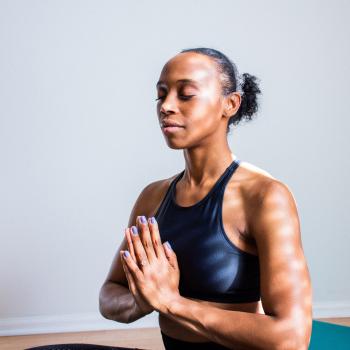
If you’ve been spiritually active over the past few decades, you’ve probably heard the word “mindfulness” once or twice—or a few hundred times. But what exactly is mindfulness? As it turns out, it depends on who you ask. Heather Hurlock, the former editor-in-chief of Mindful magazine writing on the website Super Age, points out there are a several definitions out there. Mindfulness is:
- “The awareness that arises from paying attention, on purpose, in the present moment, non-judgmentally.” ~Zen practitioner and best-selling author Jon Kabat-Zinn
- “Being aware of what is happening inside and around you in the present moment.” ~Buddhist monk and author Thich Nhat Hanh
- “Maintaining a moment-by-moment awareness of our thoughts, feelings, bodily sensations, and surrounding environment, through a gentle, nurturing lens.” ~ The Greater Good Science Center
While there’s no single definition of mindfulness, you can see the similarities above in bold type. An even simpler description comes from Dr. Ellen Langer, a woman known as “the mother of mindfulness,” who I met through Joe Burt’s Synergetic Health Newsletter. A tenured psychologist at Harvard, Langer’s work decouples mindfulness from meditation. She defines mindfulness as:
The simple act of noticing new things.
Mindfulness is not meditation—and meditation is not mindfulness
As Langer hints at in the quote above, it’s possible to be mindful without engaging in meditation. Although the two terms are occasionally used interchangeably, there is a clear distinction between mindfulness and meditation. The difference:
- Mindfulness is a state of awareness. It’s about paying attention to the present moment, without judgment, and being totally aware of your actions. You can practice mindfulness throughout the day, whether you’re eating breakfast, walking the dog, doing the dishes, or grocery shopping.
- Meditation is a spiritual practice that can help train you to be more present and aware. It involves dedicating time to focus your attention, usually by sitting quietly, concentrating on your breath and if needed, repeating a mantra. Meditation can lead to mindfulness but is not mindfulness itself.
In Aging as a Spiritual Practice, the Zen Buddhist author Lew Richmond explains that mindfulness means paying attention—without judgement or interpretation. Richmond says that “it helps us find enjoyment in the gift of each moment and each breath.” So that even in the midst of difficulty, you can accept your experience just as it is.
The benefits of mindfulness are proven
Arnold Schwarzenegger’s healthy living newsletter, Arnold’s Pump Club, consistently promotes the benefits of mindfulness and cites several scientific studies to back it up. Researchers found that practicing mindfulness can “train your brain to resist distractions and stay engaged.”
The benefits? Mindfulness encourages a sense of calm and well-being. When you learn to observe your thoughts and emotions without judgment, it can help you manage stress and lessens feelings of anxiety and depression. It can even “lower nighttime hyper-arousal, making it easier to fall asleep and stay asleep.”
Meet the master of mindfulness: Jon Kabat-Zinn
Perhaps the best know proponent of mindfulness is someone mentioned at the top of this column, Jon Kabat-Zinn. He has written over a dozen books on the subject, including the landmark Wherever You Go, There You Are. In a more recent book, The Healing Power of Mindfulness: A New Way of Being, Kabat-Zinn again makes the case for mindfulness and why it’s important. In his words:
Mindfulness is a wise and potentially healing way of being in relationship to what befalls us in life. And that includes anything and everything you or any of us might encounter—even when facing extremely challenging life circumstances.
The problem, of course, is us, and our inability to live in the present moment. This inability to focus and be aware of what is happening right now, can be our biggest barrier to finding contentment and inner peace. Yet, the solution is right in front of us, or maybe I should say within us. In the author’s words:
The roar of our thinking can be deafening and seemingly endless. It can prevent any kind of stable focus or concentration. It also completely obscures the underlying peace and silence that are to be found right beneath this tumult in the mind.
10 Tips from a Mindfulness Expert
To engage in mindfulness, the first step is to simply sit still and quiet the mind. If you meditate (or even if you don’t), this may come to you easily. You simply want to cleanse the mind of thoughts about the past or worries about the future. Then try using some of these edited pointers from The Healing Power of Mindfulness:
- To begin, ground your awareness on the breath. Rest in that space.
- Start looking at life around you, moment by moment.
- Watch events as they unfold without passing judgement. Make your attention ongoing and continuous.
- Don’t fill the present moment with anything. Drop your anxieties about the future and everything you “should” be getting done—or things that have already happened.
- Rest in awareness itself, beyond thinking altogether.
- If you find your mind wandering, bring it back to your breathing and what you’re hearing and observing. If necessary, do this over and over.
- There’s nothing to do. Rest in pure wakefulness, outside of time, with your mind spacious and open.
- Then, as you go about your day, fully engage in whatever task you’re doing. Eating, walking, working.
- Avoid multi-tasking.
- Bring mindfulness to every activity. When you’re taking a shower, check and see if you’re actually in the shower. Feel the water on your skin. Don’t let the mind check out.
Parting thought: During a lecture Kabat-Zinn once attended, one of his Buddhist mentors, Soen Sa Nim, was asked by the host about a phrase he kept repeating over and over, “Donut mind.” The host inquired, “What is this donut mind you keep talking about. I just don’t get it.” Soen Sa Sim roared with laughter and said, “That is it. Donut mind! Nothing in the middle. Just air.” 🙂
















